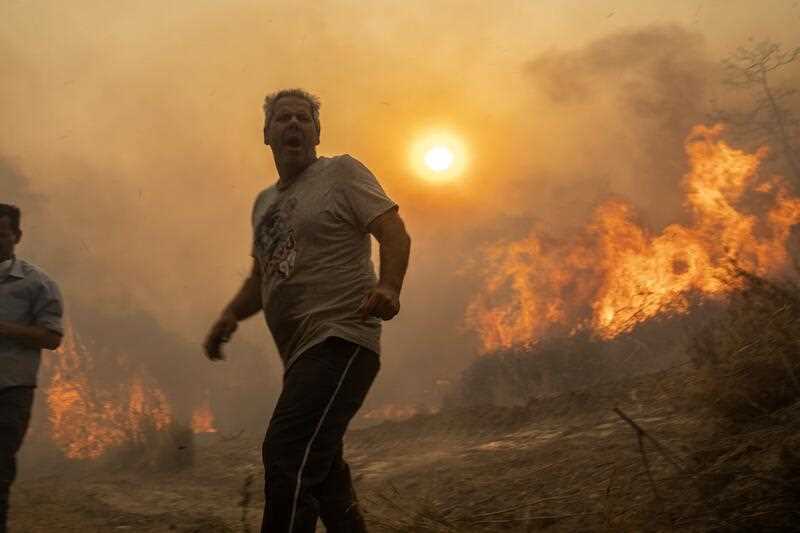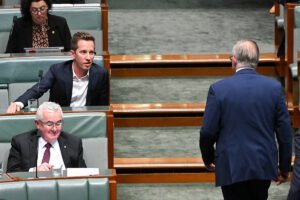Joel Jenkins
Fixing ‘global boiling’ is urgent. That’s why it has to be done slowly

As Antarctica melts into the ocean in the dead of winter and southern Italy is scorched by heat and hail and the Greek Islands burn out of control and Florida records ocean temperatures better suited to poaching eggs, this week has been a reminder that the climate is heating up a bit.
Today, UN Secretary General António Guterres declared this the era of “global boiling.” It looks like an end to temperate rhetoric too. Is now the time to panic?
This is a story of climate transition. But it’s not the type of story we’re used to hearing.
We all know that Australia has started the long and painful process of “transitioning” our economy. In stark terms, “transition” is generally understood to mean “sacking workers from coal country and starting again”. But that story never really landed. The fear that sacked workers won’t be magically employed by the new industries, and that the new jobs will be fewer and not as lucrative, has plagued all sides of politics for decades.
It is a fear not without basis. In poorly managed transitions, in places like the Appalachia in the United States, plenty of coal workers and their communities have been ghosted by opportunistic fossil fuel companies fleeing an industry in decline. Moreover, in Australia in fossil fuel communities in Central Queensland and the Hunter, many fear and distrust the faceless urban climate suit. While the suit might emote about the pain of economic transition, it is still prepared to leave fossil fuel communities to suffer for the greater good of some abstract goal of “saving the world”.
Even so, like cascading sheets of Antarctic ice there is a domino momentum behind energy transition around the world that has found a home in Australia in the Net Zero Authority established in May. This resolve for change is encouraging, because the prospect of “Miami-style poached eggs” is truly terrifying.
The challenge is now not whether we transition but how? The challenge is how to make change in ways that can hold our existential fears for the planet at bay so that people aren’t provoked to take out their anxiety on communities reliant on fossil fuels.
***
In May 2023, the Federal and Queensland Governments’ announced their most significant investment yet in renewable hydrogen technology – partnering with industry to create a 117 million dollar H2-Hub in Gladstone. The Hydrogen Hub will create a series of trial projects producing clean hydrogen and, just as importantly, use that hydrogen.
Fortescue Future Industries expects electrolysers (used to make clean hydrogen) to start rolling off the production line of its new factory this year. This state-of-the-art facility is one of the largest hydrogen-equipment manufacturing facilities in the world. Stanwell and its partners have a well-advanced project to produce vast quantities of clean Hydrogen for export, and Rio Tinto, Sumitomo and AGIG have equally ambitious projects to modernise and decarbonise the heavy industry, a major source of employment and government revenue. The 270 km2 Gladstone State Development Area and the equally critical Gladstone Port Corporation are a hive of activity with a host of publicly announced renewable energy projects and a steady stream of potential investors evaluating the area.
This all sounds great for Gladstone, right? Located in Central Queensland, a region of 65,000 people, it has long been a vital industrial hub. Anchored by a world-class natural harbour with access to abundant conventional energy and minerals, Gladstone is the 4th largest port globally for coal exports, has three major aluminium plants, the largest cement plant in the southern hemisphere, a major chemicals plant, and the latest wave of investment saw the construction of three large-scale LNG production plants and the facilities to handle LNG tankers.
The rapid expansion of hydrogen in Gladstone looks like a climate transition fairy-tale, where the domino of energy transition not only secures the existing industrial base but expands it, leading to new clean industries, skilled well-paying jobs and investment in regions that had previously been powered by coal.
If only transition could be that simple.
Long ago even the oil and gas industry clocked that bringing a new industry into a town would be a challenge for the community around it. Way before the rise of corporate social responsibility in places like Aberdeen – the “oil capital of Europe” – the energy industry collaborated with communities to address local needs and support good business, where community engagement become best practice to protect their licence to operate and create sustainable value for shareholders. Even so, the lesson from those transitions was that change was never easy.
Gladstone knows the double-edged sword of multi-billion dollar investment, having lived through waves of industrial development and a somewhat boom and bust-economy over many decades. Most recently, in the mid-2000s three separate consortia quickly developed three independent Liquefied Natural Gas (LNG) projects. Extensive community engagement took place, a shared vision of a bright future developed, and the town began to prosper. However, despite all the efforts made, it was a challenging process. Most acknowledge a lingering dissatisfaction in the community, a perception that not all the benefits were realised.
A scepticism about change remains. Just because a big company says everything is going to be okay, doesn’t mean it will be.
***
Enter the tortoise.
In 2019, after watching more than a decade of broken and polarised climate debate in Australia, the Real Deal for Australia project was founded by the Sydney Policy Lab at the University of Sydney to bridge the gap between the need for decarbonisation and the people who will be most affected by that change. Tired of breathless climate rhetoric and motivated by the idea that we needed to listen if we were to navigate a genuine transition, the project sought to create “real deals” led by communities for communities, that could address the range of challenges people faced around economic and social justice while we changed our energy system.
Let me pause for a second to emphasise what I mean by “slow change.” I am saying that climate work needs to be “slow” if we want to give big transition a chance to actually work sustainably. This is a million miles away from the fossil fuel opportunists who want to “slow” down change so that it doesn’t happen at all.
The failure of a decade of “fast” climate policies had shown that climate transition was too important and too difficult to rush. So in places like Gladstone, multi-year Real Deal projects were created to build an engine to design community-led solutions from the ground up. For the past 18 months the Real Deal has worked with the Queensland Community Alliance in Gladstone to undertake a massive listening campaign that involved 316 people and 30 organisations. Two days ago in Gladstone – as we entered “global boiling” – the Mayor of Gladstone received the Real Deal for Gladstone Community Report at a community forum.
We all know that fear comes from things that are out of our control. The listening process was designed to ask Gladstone residents what challenges they need addressed in their city as they approach a period of unprecedented change. While we can’t control the climate or the energy changes needed in response, the listening process asked people how they would design the process of change locally. Listening slowed the process of change down to give people the space to have a say about how change might happen.
The report found that the big three issues in Gladstone were healthcare, housing and liveability. More than 70% of residents talked about the challenge of healthcare. Up until June this year, this included being forced to travel hours to Rockhampton to give birth, because Gladstone Hospital closed its maternity facilities due to a lack of doctors. Let me say that again – the very place that is trying to give birth to the renewables economy had struggled to let people give birth to their babies!
And people wonder why communities are sceptical.
But the Real Deal for Gladstone report didn’t just identify problems, it named a bunch of solutions, including a policy tool that could help communities shape economic transition – Community Benefits Agreements.
Community Benefits Agreements (CBAs) were developed in the United States to allow communities to negotiate enforceable agreements with the developers of new infrastructure projects, that guarantee identified community benefits for residents. CBAs allow communities to offer support or withdraw opposition to development on the condition that the projects provide benefits to the community. For instance, in 2001 the Los Angeles Sports and Entertainment District became subject to a CBA, when a coalition of 28 community and union groups from a neighbouring low-income community negotiated an agreement that included benefits such as job training, public space, affordable housing, and living wage jobs. Similar to CBAs, some agreements initiated by Indigenous communities that have sought to share community benefits in this way, like Access and Benefit Sharing Agreements.
CBAs could help break through the “shouty fast” impasse that has plagued Australia’s climate politics. Instead of transition being done “to” communities, CBAs can help communities shape the process of change by negotiating for changes that make their lives better. CBAs can help make new renewable investments accountable to the communities in which they land.
And CBA’s are a win for industry too. Industry knows that quick and dirty “post-it note” consultation is limited, and they also know the risks that can happen when consultation goes wrong. Just look at the challenges around Victoria’s transition lines right now. CBAs offer a pathway for win-win industry and community collaboration and dispute resolution, where common ground can be found.
As we move into the era of “global boiling” let us hope that some steadier heads rise. Fast fear will not get us out of the hole that we have dug for ourselves. But slow change put into the hands of the many might help us find a way through together.






